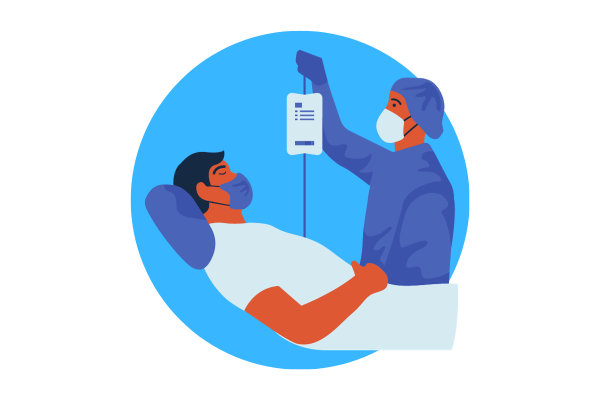Key Words
- Inflammatory Bowel Disease
- IBD Clinical Nurse Specialists
- IBD Advanced Nursing Practice
- Gastroenterology Nursing
- Education
Abbreviations
Inflammatory Bowel Disease (IBD)
Royal College of Nursing (RCN)
Nursing and Midwifery Council (NMC)
Health Education England (HEE)
United Kingdom (UK)
British Society of Gastroenterology (BSG)
Learning Points
- IBD Specialist Nursing is a diverse discipline requiring specialist and advanced practice education
- The RCN Framework for Professional Practice for nurses working in Inflammatory Bowel Disease provides a framework for career progression
- A trained specialist IBD nurse is essential for good patient outcomes
Introduction
IBD Nursing: an important and evolving speciality
IBD nursing evolved from an understanding that care was needed beyond outpatient appointments for people living with IBD[1]. The complexity of care for people living with IBD is growing. IBD nurses need an in depth understanding of IBD and the medical and surgical treatments on offer[2]. A Crohn’s & Colitis UK campaign in 2016 led to an increased awareness of the value to patients of having access to a specialist IBD Nurse[3]. This campaign has seen a rapid increase in IBD nursing posts with 394 being identified in 2020, up 38 % from an initial census in 2016[4]. With the increasing complexity in care and the growing number of IBD nurses, this has led to a need for education in the speciality, but also a requirement for development in advanced nursing skills to underpin the advancing speciality knowledge and decision making needed to support people living with complex IBD. IBD Nurses after all have been identified as the most important access point and manager of the complex needs of people living with IBD by the patients themselves[4, 5].
Understanding the role of an IBD specialist nurse
There are role descriptions of IBD nursing available from the RCN[6] and a consensus statement from the nursing branch of the European Crohn’s and Colitis organisation N-ECCO on what IBD nursing is[2]. The N-ECCO statement highlights two levels of IBD nursing; one of which is described as advanced. This recognition of advancing practice in IBD nursing has found support from Crohn’s & Colitis UK in its nurse specialist programme supporting Advanced Practice education at master’s level and in a joint venture with the Royal College of Nursing (RCN). The credentialing of IBD advanced nurse practitioners with accompanying (soon to be published) new Framework for Professional Practice for nurses working in IBD[7] to support this process has now become a reality [8]. Recognising the benefits for a specialist IBD nurse in every service is now well understood. IBD nurses provide improved access to care, reduction in waiting times, and improved patient outcomes[2, 4, 9].
IBD Nurses: What is needed in the toolbox to become an expert practitioner
Looking at the four pillars of Advanced Clinical Practice published by Health Education England(HEE) can help current and future IBD nurses prepare for the complex decision making required in IBD nursing[10], these are broadly the same across the four nations of the UK[11]. The work soon to be published from the collaboration between Crohn’s & Colitis UK and the RCN IBD network builds on the work by Alison Leary for HEE and identifies that IBD nurses need skills that are: Enhanced, Advanced, or at Consultant Level[7, 12]. They will be mapped against the four pillars of advanced practice:
- Clinical Practice
- Leadership and Management
- Education
- Research[10]
The specialist IBD nurse roles have developed from a simple supporting role of advice and guidance and emerging is an independent practitioner able to support and make and deliver the complex care decisions related to treatment in an interdisciplinary team[13].
The IBD specialist nurse and what is required of them
Clinical Skills
The N-ECCO consensus statements outline the demands placed on an IBD specialist nurse, they are varied and increasingly complex[2]. Table 1 below outlines the varied aspects of the IBD specialist nurse role. The new RCN framework for professional practice for nurses working in Inflammatory Bowel Disease offers a framework of clinical activity for each level of IBD Speciality Nursing. Theses outlines from N-ECCO and the RCN offer tools for IBD nurses to benchmark their own practice and skills and decide what education and training they may need.
| Fundamental IBD Nursing | Advanced Nursing roles in addition to fundamental |
| IBD Diagnosis and treatments | MDT working |
| Patient Advocacy and person-centred care | Autonomous practice |
| Communication with the patient with IBD | Advanced Clinical practice |
| Managing Fistulae | Triage of need |
| Diet and Nutrition | Patient information and education |
| Incontinence | Service development |
| Sexuality and IBD | Supporting transition |
| Pain Management | Pregnancy and Fertility |
| Biologics therapies | Independent prescribing |
| Health Maintenance | Supporting patients with ileoanal pouches including pre surgical care |
| Fatigue | IBD in elderly patients |
| Demonstrating the benefit of an IBD nurse |
Table 1: N-ECCO consensus statement headings and roles adapted from the European Nursing Roles in Caring for Patients with Crohn’s Disease or Ulcerative Colitis[2].
Training
There are challenges to accessing training in specialist nursing and IBD is no exception, the RCN and the British Society of Gastroenterology offer a hub for resources and guidelines[6, 14]. Learning from others at webinars and study days is one way of supporting this specialist knowledge need. Attendance at national and international conferences is expensive, but can also build knowledge and a network of specialists that become a resource for your own practice[15]. Accessing advanced clinical practice training is more straight forward and most accredited courses offer a standardised approach to education at master’s level which incorporates physical examination, prescribing and critical thinking, and decision-making education. There are also masters modules available with an IBD focus as well as more generic gastroenterology modules at degree level, however these are few and far between and places are limited. IBD specialist nurses may need to use the new RCN framework for professional practice for nurses working in IBD[7], to support funding applications and requests for study leave.
Personal attributes and the importance of maintaining competence
The Nursing and Midwifery Council outlines the required moral, ethical, and professional code for nurses, and the attributes required for any nursing practice[16]. The NMC Code states emphatically that nurses must maintain competence in the field of IBD as it is a dynamic discipline and the IBD specialist nurse is no exception to these rules.
Conclusion
Specialist IBD nurse roles have developed from a simple supporting role of advice and guidance, and are emerging as independent practitioners able to support, make, and deliver the complex care decisions related to treatment in an interdisciplinary team[13, 17]. The concept of three levels within specialist nursing outlined in the soon to be published RCN framework for professional practice for nurses working in IBD[7], together with the N-ECCO consensus statements, provides clear guidance and what is required to be a successful and effective IBD specialist nurse with an emerging clarity around career progression. This in turn will support the care of people living with complex IBD by providing safe and effective care from IBD nurses that have the skills required to manage the complex treatments in a dynamic treatment landscape.
Author Biography

Pearl Avery, St Mark’s specialist Bowel Hospital and Wyke Regis & Lanehouse Medical Centre, is an advanced clinical practitioner in Inflammatory Bowel Disease (IBD) and elected nurse representative for the IBD section clinical research group for the BSG. Pearl believes that nurses are integral to identifying research that matters to people with IBD and that nurses should lead on and in research.
Currently working at St Marks Specialist Bowel Hospital and Wyke Regis and Lanehouse medical centre, Pearl is also currently undertaking a PhD at Bournemouth University. Her research seeks to understand the experience of people with IBD and the healthcare professionals supporting them of using eHealth to support follow-up and self-management.
Statement of any potential perceived conflicts of interest
Pearl Avery has been involved in education events supported by Pharma as a speaker or a member of the steering group:
- Tillotts
- Dr Falk
- Ferring
- Celltrion
- Janssen
CME
Rheumatological Manifestations of IBD for the Practising Clinician
03 April 2025
Pre-Assessment in Endoscopy Nursing
12 March 2025
IBD Surveillance Colonoscopy – This is how I do it
03 December 2024
- Phillips S. Gut reaction. Nursing times 1995;91:44-5.
- Kemp K, Dibley L, Chauhan U, Greveson K, Jäghult S, Ashton K, et al. 2nd N-ECCO Consensus Statements on the European Nursing Roles in Caring for Patients with Crohn's Disease or Ulcerative Colitis. J Crohns Colitis 2018.
- Mason I. An important specialism. Nursing Standard 2017;31:31.
- Younge L, Mason I, Kapasi R. Specialist inflammatory bowel disease nursing in the UK: current situation and future proofing. 2020.
- IBDUKteam. Home | IBD UK. @IBDUKteam, 2019.
- Nursing RCo. Roles descriptives for inflammatory bowel disease nurse specialists | Royal College of Nursing. 2007.
- Mason ID, J; Stansfield, C; Younge, L; Barker, L; Crook, K; Czuber-Dochan, W; Fraser, A; Johns, K; Lee, G;. Framework for Professional Practice for nurses working in Inflammatory Bowel Disease in adult and paediatric care settings. Royal College of Nursing, 2022.
- Crohns & Colitis UK. Crohn’s & Colitis UK Nurse Specialists recognised by the Royal College of Nursing | Crohn's & Colitis UK. @CrohnsColitisUK, 2022.
- Leary A, Punshon G. Modelling Caseload for IBD CNS CCUK report 2017.
- Health Education England. Advanced Practice Frameworks. 2017.
- Council of Deans for Health. An overview of advanced practice policy across the UK. 2022.
- Leary A. Enhanced Practice A workforce modelling project for Health Education England. 2019.
- Avery P. Advanced Practice Nursing in Inflammatory Bowel Disease. https://doiorg/1012968/gasn201816816 2018.
- British Society of Gastroenterology. BSG consensus guidelines on the management of inflammatory bowel disease in adults. 2019.
- Meiring A. The value of networking for professional nurses. Professional Nursing Today 2018;22:2-.
- Nursing CM. Read The Code online. London, 2015.
- Younge L, Mason I, Kapasi R. Specialist inflammatory bowel disease nursing in the UK: current situation and future proofing. Frontline Gastroenterology 2021;12:169-74.
